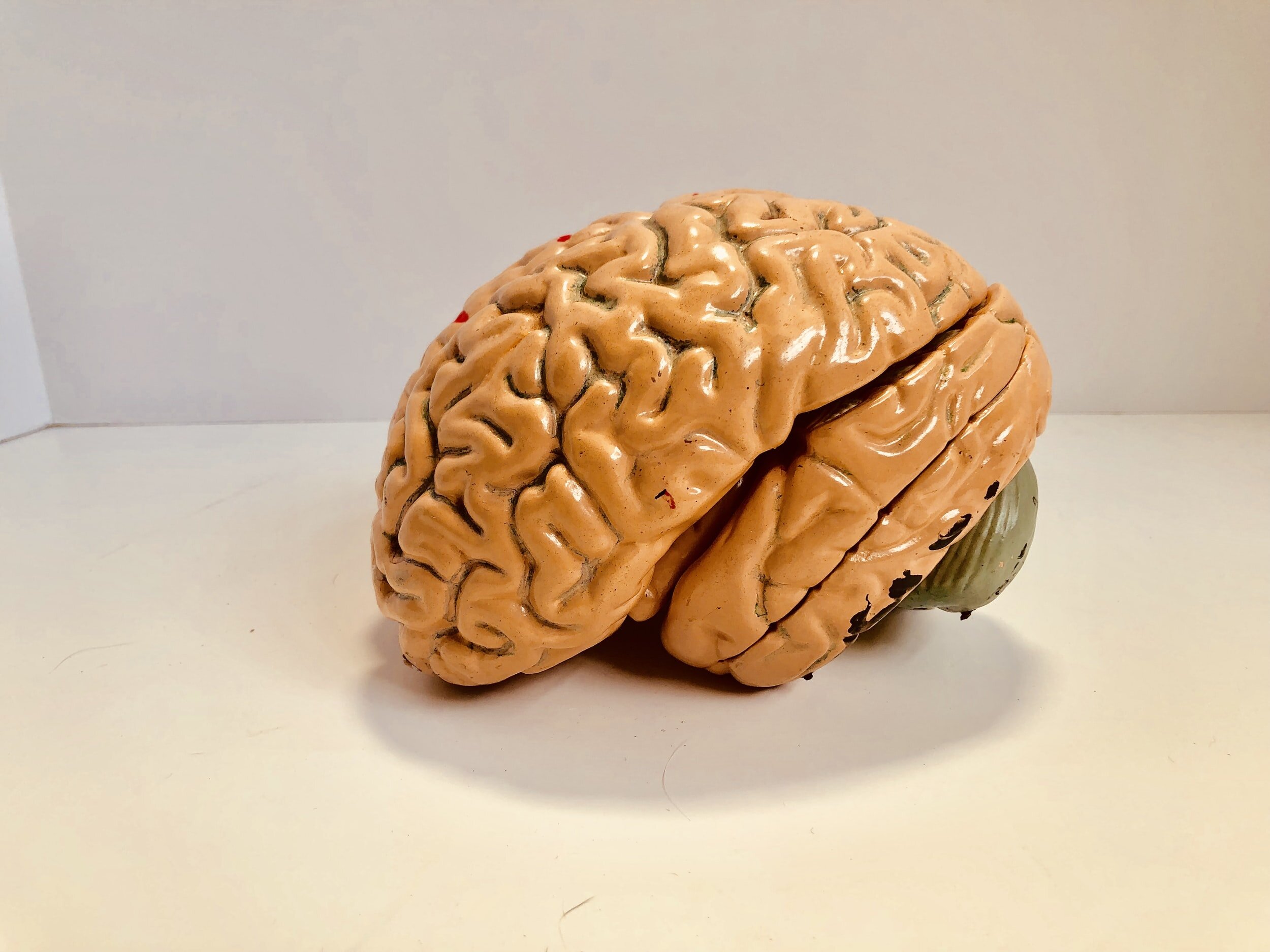IBD | Information

Image of a model of the brain by Natasha Connell on Unsplash
In 1951, Dr. Walter I. Tucker lauded what he believed was a breakthrough treatment for ulcerative colitis. The psychologist claimed that a rather risky procedure freed a 35-year-old woman from severe symptoms of the disease. Within months of the surgery, the patient was gaining weight, socially active, and working regularly. She showed no signs of gastrointestinal disease or other ailments.
You might be surprised to learn that the treatment Dr. Walter Tucker exalted was not a colectomy. In fact, the surgeon did not operate on the 35-year-old woman’s digestive track at all. This new ‘cure’ for ulcerative colitis was a dangerous lobotomy in which the surgeon drilled two holes into the patient’s skull and melted away two wedges of her cerebral cortex. Why would a surgeon operate on a patient’s brain when the colon was a problem? Why did they believe such a risky surgery was the solution?
The answers to these questions rest primarily in the vogue nineteenth-century notion that ulcerative colitis was psychosomatic. That is to say, the disease was caused by mental or emotional problems. This myth arose from ancient observations of emotions’ impact on the body. Stomach aches and diarrhea were common symptoms experienced by people during periods of heightened anxiety. Psychiatrist Helen Flanders Dunbar’s 1935 collection of persuasive anecdotes promoted this connection, setting the stage for many to view physical illnesses as psychosomatic. Columbia University Medical student Cecil Murray, more directly linked emotions and ulcerative colitis in an article he wrote for The American Journal of the Medical Sciences. Murray claimed that he discovered common traits among 12 patients with ulcerative colitis. One woman had a conflictual relationship with her domineering mother and another was described as a “fanatical housewife.” They all experienced symptoms of acute anxiety right before the onset of their gastrointestinal issues.
Murray’s idea immediately gained popularity in the gastroenterology and psychology community. Disciples of Freud further fueled this shaky theory. By the late 1940s, many medical journals blamed ulcerative colitis patients’ emotional sensitivities for their disease. Psychologists even described ulcerative colitis patients as having particular personalities. They were depressed, immature, over-emotional, and often had strained relationships with their families. The authors did not consider other factors that could have contributed to digestive problems. They focused solely on emotional causes.
Support for lobotomies aided by the lack of adequate treatments for this deadly disease. Medications were largely ineffective, and the only known ‘cure’ was removing the colon, which, as difficult as it is today, was even more challenging in the mid-twentieth century. The surgery killed nearly 22% of patients and left others trying to adapt to a world with limited resources for ostomates. While innovations were underway for ostomy products in the 1950s, most manufacturers used heavy rubber pouches and rubber or plastic faceplates. Patients also contended with significant stigma. For some doctors and patients, the risk of brain surgery seemed worthwhile.
Psychologists and doctors hypothesized that if they could disconnect the nervous system from the gut, the colon could heal. As a result, they locked ulcerative colitis patients in psychiatric wards where they subjected them to electroshocks, psychotherapy, novocaine injections into the brain, and even the slicing of the vagus nerve, which connects the brain to the digestive system. As time passed, doctors proposed riskier experiments.

Photo of laboratory equipment on a counter by Ibrahim Boran on Unsplash
The first official proposal to treat ulcerative colitis with a lobotomy occurred during a 1948 postmortem conference at the University of Iowa. A 23-year-old ‘housewife’ had wasted away to a skeleton before dying of ulcerative colitis. The physicians wanted to know what else they could have done for this woman. A surgeon at the conference suggested the use of a lobotomy. Three years later, the first recorded lobotomy was performed and deemed a success.
In the following decades, dozens of women with severe ulcerative colitis were given lobotomies. The University of Oklahoma performed five lobotomies on ulcerative colitis patients (three women and two men). The doctors reported that the surgery relieved the three women of their symptoms without causing any negative side effects. Both male patients died in the hospital. The doctors did not regularly follow up with the women after the reported success, so we have no idea what these women faced in the long run.
The use of lobotomies to treat both physical and mental illnesses came to an end in the late 1950s due to both the gruesome nature of the procedure and advances in medicine. Doctors began treating ulcerative colitis and other psychosomatic illnesses with steroids.
The transition from lobotomies to pharmaceutical medicines was clearly a positive advancement for people with ulcerative colitis. Nevertheless, the archaic notion that emotions were the primary cause of the disease prevailed in the medical community. It was not until 1990 that the Journal of American Psychology published an article confirming that serious flaws and biases were found in almost all studies connecting ulcerative colitis to psychiatric factors. For instance, all of the studies lacked control samples.
Modern science tells us ulcerative colitis and Crohn’s Disease are caused by an immune response in which the immune system mistakenly attacks the digestive tract. Although some believe that stress can exacerbate symptoms, scientists acknowledge that it does not cause the disease itself.
Unfortunately, old ideas do not die easily. While treatment for IBD and other diseases has advanced, many patients continue to believe that their emotions or stress level triggered the disease. I remember researching the disease just after my diagnosis and coming across patient blogs or “out there” websites that attributed IBD and other autoimmune disorders to personalities. Even though my years of training in historical research allowed me to recognize the illegitimacy of these sources published by unknown people without proper citations, these notions still haunted the corners of my mind like a distant memory I could not shake.
I was fortunate to have a great doctor who assured me that I had not done anything to bring this disease on myself, while simultaneously acknowledging that that stress can exacerbate matters. When I drove home from that appointment (or rather as my mother drove me home because I was in no state to drive) I could not help but wonder if my personality had an influence on this disease. I still find myself wondering if my high-strung type-A personality contributed to the severity of my disease.
The unsettling history of ulcerative colitis treatment serves as a reminder to always be mindful of medical myths and fads. There are dozens of websites and influencers claiming that diseases can be cured or reduced through lifestyle changes, diet changes, and alternative medicines. While there is nothing wrong with safely incorporating some of these ideas into our treatment plan, we should never allow ourselves to take the blame for our disease or a treatment failure. We need to be on alert for unsupported claims, especially those rooted in sexism and racism, and challenge myths. We need to be advocates.
Hollister, (2016). “We’ve Come a Long Way.” Holister.com
Kirsner, J. (2007). “Historical Origins of Current IBD Concepts.” World Journal of Gastroenterology.
